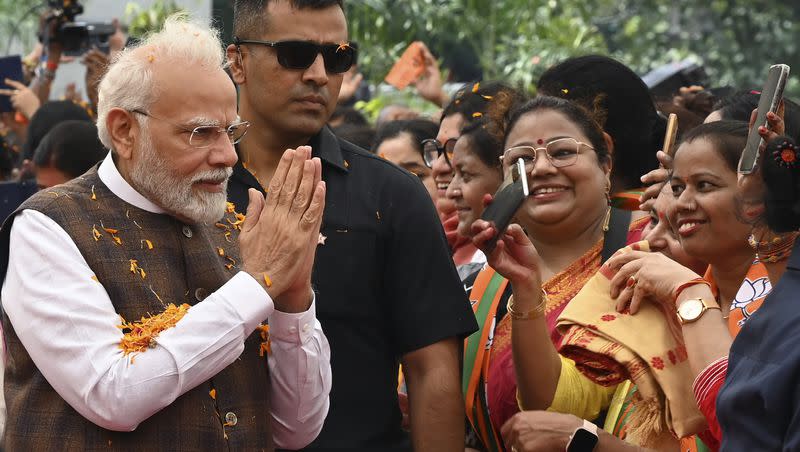Indian Parliament will reserve 33% of seats for women

- Oops!Something went wrong.Please try again later.
The Indian Parliament almost unanimously passed a historic bill that would reserve one-third of the seats in the parliament’s lower chamber and state legislatures for women.
Prime Minister Narendra Modi applauded the work done by lawmakers to pass the Women’s Reservation Bill, which would amend the Indian Constitution.
“There were many hurdles. There were old problems. But when one’s intent is good, results do come. The absolute support the bill got in parliament is a record,” Modi said of the act which 454 lawmakers supported and only two opposed.
“Today the country is removing all hurdles coming in the way of mothers and sisters. We made one scheme after another for the same.”
Delighted at the passage of The Constitution (One Hundred and Twenty-Eighth Amendment) Bill, 2023 in the Lok Sabha with such phenomenal support. I thank MPs across Party lines who voted in support of this Bill.
The Nari Shakti Vandan Adhiniyam is a historic legislation which…— Narendra Modi (@narendramodi) September 20, 2023
The idea to reserve seats for women was deliberated in the late 1990s but a lack of consensus among parties made it tough to pursue. Since 1996, there have been six unsuccessful attempts to pass the Women’s Reservation Bill.
The Hindustan Times, a daily newspaper in India, noted that the G20 Declaration that came out of the summit in New Delhi earlier in September included a paragraph that calls for gender equality and highlights the need for female empowerment. India is working towards that goal while calling for full and effective participation of women in political and public spheres.
Reuters reported that other South Asian countries like Nepal and Bangladesh are also instituting a requirement that would increase the participation of women in parliament.
In India, the world’s largest democracy, women make up half of the 950 million registered voters but represent roughly 15% of the lawmakers in parliament, according to CNN. The U.S. isn’t too far ahead on this front either, with roughly 28% of lawmakers in Congress being women.
Still, the latest bill in India still has a ways to go. It will be implemented only after the new census and the adjustment of voting districts post after next year’s polls — which would mean a long wait until 2029.
Sonia Gandhi, a leader of Modi’s opposition party Indian National Congress, called for the immediate implementation of the bill.
“I want to ask, in the past 13 years, women have waited patiently for this bill,” she said during the debate on the parliament floor. “But now, our women have been asked to wait for some more years. How many years? 2, 3, 6, 8? How many years?”
“Any further delay to implement this bill will be an injustice to women. It must be implemented at the earliest,” Gandhi said.

